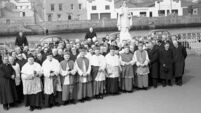Sorry is still the hardest word for the leaders of Sinn Féin

Sinn Féin First Minister of Northern Ireland Michelle O'Neill with Deputy First Minister Emma Little Pengelly at the State Funeral for former Taoiseach John Bruton in Saints Peter and Paul's Church, Dunboyne, Co Meath. Picture: Leon Farrell/© RollingNews.ie
It would be gratuitous not to congratulate Michelle O’Neill of Sinn Féin (SF) and Emma Little-Pengelly of the Democratic Unionist Party (DUP) on their day in the sun. Especially O’Neill who made an almost royal descent down the famous staircase of Stormont in regulation high heels.
The occasion was steeped in history. The founding purpose of devolved government in the North was to secure ‘a Protestant Parliament for a Protestant people’ and the border’s boundaries were drawn to secure Protestant and unionist control. And it did, since 1922.
But now, it might be argued, all has changed, changed utterly (or at least symbolically), as a nationalist representing a new majority is the titular head of the government of Northern Ireland. Changed? Well, maybe but, as we have learned to accept, in effect very little has changed at all.
While the former Irish rugby international, Andrew Trimble, wondered aloud in an RTÉ documentary why in terms of identity, the question of Protestant or Catholic in the North was so compelling while at the same time so irrelevant in the South, the new First Minister and her Deputy were making their way home after representing their respective tribes at the funeral of John Bruton under the protection of Police Service of Northern of Northern Ireland. Who could have predicted it?
It would, of course, be utterly naïve to imagine that anything has changed or that the ‘new dawn’ promised by O’Neill represents anything more significant that a PR gloss on an enduring SF antipathy towards the DUP and vice-versa.
Little more, possibly, than a divvying up of the spoils of office as periodic elections throw up yet another sequence in the ritual dance (since 2002) of collapsing/restoring the Northern Executive – with one stepping out and another stepping in again.
The presumption of a united Ireland, fuelled by Mary Lou McDonald suggesting it was now within ‘touching distance’, is part of the grand plan to unite Ireland (or to ensure that it remains disunited) by repeating the old slogans to keep the troops happy.
There’s no real effort to devise strategies that will unite the people or help to cross the great canyon of bitterness and recrimination that is the prevailing legacy of life in the North. And PR guff about ‘serving everyone equally’ and being ’a First Minister for all’ are no more than cliches to be taken out and dusted down periodically but not to be taken at face value.
Michelle O’Neill made that clear when, in an interview on the very day of her triumphal entry into Stormont as First Minister, she was asked if she would apologise on behalf of SF/IRA for the Provo campaign of violence, mayhem, death and destruction that had brought such suffering in its wake. She immediately lapsed into defence mode. No, she said, because it was justified in the circumstances. It was an instinctive reaction – as if she had been asked if she took sugar in her tea. The question was expected and the response automatic.
But Michelle O’Neill and Mary Lou McDonald both know that the Provo campaign of violence was not justified in the circumstances. It’s the great lie that on repetition is presumed to be true.
It cannot be true that a 30 year-long campaign of indiscriminate murder can be justified on the basis of the discrimination and domination of Catholics/nationalists by Protestant/unionist privilege. As Martin Doyle writes in his recent book, : "If discrimination and domination are bad, does it really have to be said that indiscriminate murder is so much worse?"
To accuse anyone of saying that indiscriminate murder can be justified on the basis of discrimination and domination is effectively to accuse them of lacking a moral centre. I have no doubt but that is not true of Michelle or Mary Lou but I leave it to them to navigate that territory for themselves. But what they can’t do is pretend that discrimination justifies murder – and history (and heroes like Martin Luther King) testify to that. Discrimination can never be a justification for murder.
In his poem, , John Montague wrote with justified exasperation:
In Martin Doyle’s book, of the many families whose lives were ruined by the Provo campaign of violence, the name of Mary Casey stands out. Her father, Jack McCann, was killed in an explosion as he was driving a coal lorry, covering for another man who was going to a wedding. Mary was 21 at the time and she told Simon Carswell of that her father was identified by the braces of his trousers. There was no corpse. His wife, struggling with cancer, was sedated and couldn’t attend the funeral. She died in December 1973, with Mary losing both parents within fifteen months.
She told Carswell: "The one killer who got away, I would like to meet him. Nothing will ever come out of it, but I just want to look into his eyes and see what kind of life he had. I just want someone to say sorry. No one has ever come and said sorry."
The day Doyle was writing about Mary O’Sullivan, an opinion poll published in the found that 69% of Northern nationalists and republicans agreed with Michelle O’Neill, then NI First Minister Designate, that "violent resistance to British rule during the Troubles" was the only option.
‘Sorry’ can sometimes be the hardest word to say.




